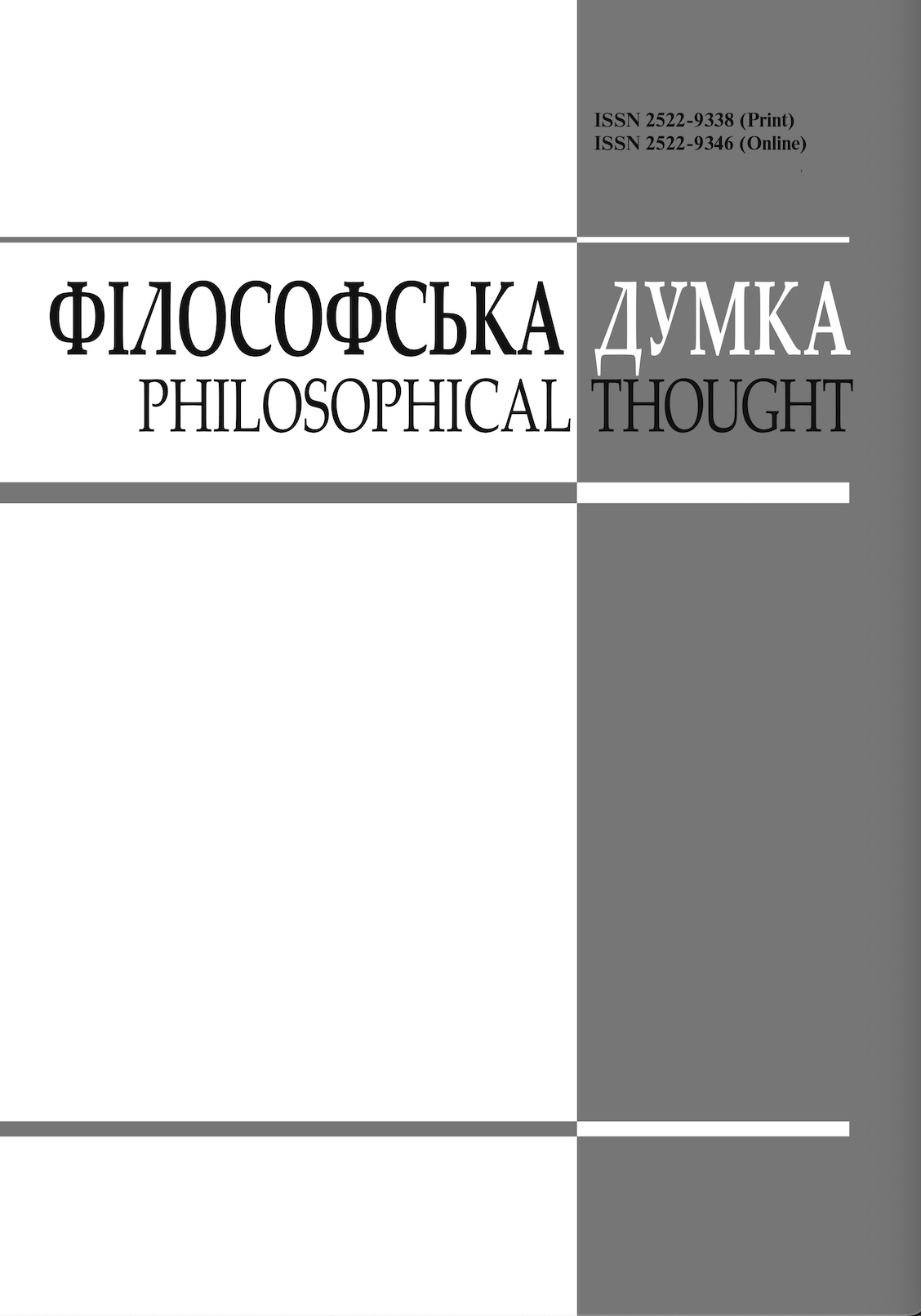The concept of immortality and the transformation of the idea of enlightenment: I. Kant and J. M. E. McTaggart
DOI:
https://doi.org/10.15407/fd2024.02.078Keywords:
I. Kant, J. E. McTaggart, immortality, Enlightenment, constellation, mindAbstract
The article examines the constellation of the interpretation of the concept of immortality in the corpora of ideas of I. Kant and J. E. McTaggart in conjunction with modern trends in the transformation of the idea of Enlightenment. The correctness of the applications of the constellation method in relation to the work of I. Kant and J. E. McTaggart is substantiated. The traditional idea of the work of the English philosopher as meaningfully belonging to the Hegelian tradition is problematized, and the formal nature of this affiliation is indicated. The possibility of a constellational examination of the closeness of the understanding of the idea of immortality and its meaning within the framework of a whole metaphysical system in the context of the philosopher's understanding of time and space in I. Kant and J. E. McTaggart is indicated. The importance of the manifested interpretation of the constellational consideration of the idea of immortality for understanding the content of modern transformations of Enlightenment ideas and responding to the challenges of the latest formats of rebellion against reason is outlined.
References
Baudrillard, J. (2004). Simulacra and simulation. [In Ukrainian]. Kyiv: PH of Solomiia Pavlychko "Osnovy".
Bostrom, N. (2020). Superintelligence: Paths, Dangers, Strategies. Strategies and dangers of the development of intelligent machines. [In Ukrainian]. Kyiv: Nash format.
Wittgenstein, L. (1995). Tractatus logico-philosophicus. Philosophische untersuchungen. [In Ukrainian]. Kyiv: Osnovy.
Kant, I. (1989). The answer to the question: what is enlightenment? [In Ukrainian]. Vsesvit, 4, 135-138. Retrieved from: https://vpered.wordpress.com/2019/07/04/kant-erklarung/
Kant, I. (2000). Criticism of pure reason. (Tr. by I. Burkovskyi.) [In Ukrainian]. Kyiv: Univers.
Kant, I. (2004). Criticism of practical reason. [In Ukrainian]. Kyiv: Univers.
Kozlovskyi, V. (2008). Models of the reconstruction of Kantian anthropology. [In Ukrainian]. In: Mohylyans'ki istoryko-filosofs'ki studiyi (pp. 39-105). Kyiv: Kyiv-Mohyla Academy Publishing House.
Kozlovskyi, V. (2009). Immanuel Kant's metaphysics and psychology: origins and receptions. [In Ukrainian]. NaUKMA Research Papers in Philosophy and Religious Studies, 89, 16-22.
McTaggart, J. M. E. (2022). The Nature of Existence. Vol. 2. [In Ukrainian]. Kyiv: Tempora.
Marion, J.-L. (2014). What metaphysics does the method contain? [In Ukrainian]. In; J.-M. Beysad, J.-L. Marion, K. S. On-Wang-Kun, Descartes' meditations in the mirror of modern interpretations (pp. 67-93). Kyiv: Dukh i litera.
Pinker, S. (2019). Enlightenment Now: The Case for Reason, Science, Humanism, and Progres. [In Ukrainian]. Kyiv: Nash format.
Terletskyi, V. (2016). Limits and possibilities of the constellation research method. [In Ukrainian]. Sententiae, 1, 169-178. Retrieved from: http://nbuv.gov.ua/UJRN/senten_2016_1_14
https://doi.org/10.22240/sent34.01.169
Acosta, H. L. P. (2018). Theoretical assumptions in Kant's theory of time. Sincronia, Feb. 06. Retrieved from: https://www.redalyc.org/journal/5138/513855742003/
Ameriks, К. (2000). Kant's Theory of Mind: An Analysis of the Paralogisms of Pure Reason Get access Arrow. Oxford: Oxford University Press. https://doi.org/10.1093/0198238975.001.0001
https://doi.org/10.1093/0198238975.001.0001
Englert, A. T. (2023). Kant's Favorite Argument for Our Immortality: The Teleological. Argument. Res Philosophica, 100(3), 357-388. Retrieved from: https://philarchive.org/archive/ENGKFA
https://doi.org/10.5840/resphilosophica202373101
Galloway, G. (1920). The philosophy of religion. New York: Scribner's Sons.
Geach, P. T (1979). Truth, Love and Immortality, and introdution to McTaggart's philosophy. Oakland: University of California Press.
Hahmann, A. (2018). Kant's Critical Argument(s) for Immortality Reassessed. Kant Yearbook, 10(1), 19-42. https://doi.org/10.1515/kantyb-2018-0002
McDaniel, К. (2020). John M. E. McTaggart. The Stanford Encyclopedia of Philosophy. Retrieved from: https://plato.stanford.edu/archives/sum2020/entries/mctaggart/
Moore, G. E. (1903). Mr. McTaggart's ethics. International Journal of Ethics, 13 (3), 341-370.
https://doi.org/10.1086/intejethi.13.3.2376402
Obdrzalek, S. (2021). The Philosopher's Reward: Contemplation and Immortality in Plato's Dialogues. Immortality in Ancient Philosophy, 66-92. Cambridge University Press. https://doi.org/10.1017/9781108935777.004
https://doi.org/10.1017/9781108935777.004
Passmore, J. (1966). A Hundred Years of Philosophy. London: Gerald Duckworth and Co. Ltd.
Ross, B. (2019). Transhumanism: an ontology of the world's most dangerous idea. Retrieved from: https://digital.library.unt.edu/ark:/67531/metadc1505282/m2/1/high_res_d/ROSS-DISSERTATION-2019.pdf
Ross, N. (2020). Walter Benjamin's First Philosophy: Towards a Constellational Definition of Experience. Open Philosophy, 3, 81-101. Retrieved from: https://www.researchgate.net/publication/339406466_Walter_Benjamin's_First_Philosophy_Towards_a_Constellational_Definition_of_Experience
https://doi.org/10.1515/opphil-2020-0006
Rukgaber, M. (2010). Time and Metaphysics: Kant and McTaggart on the Reality of Time. Kant Yearbook, 2, 175-194. https://doi.org/10.1515/9783110222937.175
Sharma, R. K. (2015). J. M. E. McTaggart: Substance, Self, and Immortality. Lexington Books.
Sheets-Johnstone, M. (2003). Death and immortality ideologies in Western philosophy. Continental Philosophy Review, 36(3), 235-262. https://doi.org/10.1023/B:MAWO.0000003937.47171.a9
https://doi.org/10.1023/B:MAWO.0000003937.47171.a9
Tizzard, J. (2020). Why Does Kant Think We Must Believe in the Immortal Soul? Canadian Journal of Philosophy, 50(1), 114-129. https://doi.org/10.1017/can.2019.10
Downloads
-
PDF (Українська)
Downloads: 106
Published
How to Cite
Issue
Section
License
Authors who publish with this journal agree to the following terms:
- Authors retain copyright and grant the journal right of first publication.
- Authors are able to enter into separate, additional contractual arrangements for the non-exclusive distribution of the journal's published version of the work (e.g., post it to an institutional repository or publish it in a book), with an acknowledgement of its initial publication in this journal.
- Authors are permitted and encouraged to post their work online (e.g., in institutional repositories or on their website) prior to and during the submission process, as it can lead to productive exchanges, as well as earlier and greater citation of published work (See The Effect of Open Access).


